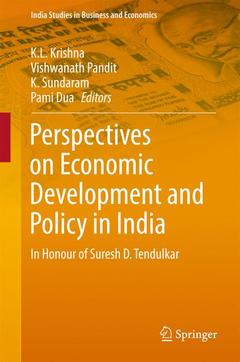Description
Perspectives on Economic Development and Policy in India, Softcover reprint of the original 1st ed. 2017
In Honour of Suresh D. Tendulkar
India Studies in Business and Economics Series
Coordinators: Krishna K.L., Pandit Vishwanath, Sundaram K., Dua Pami
Language: English
Subjects for Perspectives on Economic Development and Policy in India:
Publication date: 12-2016
Support: Print on demand
Publication date: 07-2018
Support: Print on demand
Description
/li>Contents
/li>Biography
/li>Comment
/li>
The book pays tribute to the celebrated economist Professor Suresh Tendulkar?s contribution and scholarship to economics, economic-policy making, and economic reforms in India. Professor Tendulkar served on numerous panels and commissions set up to reform diverse aspects of India?s economy. To name a few, he served as the Chairperson of the Prime Minister?s Economic Advisory Council, Chairman of the National Commission of Statistics, National Sample Survey Organisation, Committee on National Accounts, and as a member in the Fifth Pay Commission, the Disinvestment Commission (1996). He is credited with devising the new method to estimate poverty in India which resulted in India?s poverty estimates being scaled up.
This book primarily focuses on Professor Tendulkar?s contributions on economic planning in India, the political economy of economic reforms, and his important conceptual and policy-relevant work on poverty measurement. The three sub-themes of the book ? Economic Reforms and Policy Formulation, Poverty and Inequality, and Development and Trade ? are indicative of his specific research interests, namely poverty and well-being, and India and the world economy. It covers both micro and macro aspects relevant to the Indian economy. The econometric techniques utilized encompass state-of-the-art microeconometric as well as macroeconometric models. The book contains contributions from eminent economists associated with Professor Tendulkar, and is useful for readers from the undergraduate through the Ph.D. level as well as researchers and practitioners of economics.
Prof. K.L. Krishna is currently Chairperson of Madras Institute of Development Studies. He has been leading the India KLEMS Productivity project, funded by the Reserve Bank of India, as part of the World KLEMS Initiative, since 2009. In the past, he has served as Director, Delhi School of Economics; Head, Department of Economics as well as Dean, Faculty of Social Sciences, University of Delhi. He was also Executive Director, Centre for Development Economics; Founder Managing Editor, Journal of Quantitative Economics; and President, The Indian Econometric Society. He did his Ph.D. in Economics from the University of Chicago and is an expert on econometrics, industrial economics, economics of productivity, regional inequality and empirics of trade.
Prof. Vishwanath Pandit is former Vice-Chancellor of the Sri Sathya Sai Institute of Higher Learning (Deemed University). He has served as Head of the Department of Economics, Delhi School of Economics and is former Executive Director of Centre for Development Economics and President of The Indian Econometric Society. He was honoured with the UGC Swami Pramavanada Saraswati National Award for 2004. He completed his Ph.D. from the University of Pennsylvania under Late Nobel Laureate Prof. Lawrence Klein and has worked extensively on macroeconomics and policy modelling, especially in the context of India.
Prof. K. Sundaram is Chairman, Advisory Committee on National Accounts Statistics, Central Statistical Organization, GoI and member, Expert Group to Review the Methodology for Measurement of Poverty, Planning Commission, GoI. He served as Head, Department of Economics as well as Dean, Faculty of Social Sciences, University of Delhi. Additionally, he was Regional Adviser, Asia and Pacific, International Labour Organization (Bangkok) and was associated with the National Sample Survey Organization, GoI. He received his Doctorate from the Delhi School of Economics and his research interes




